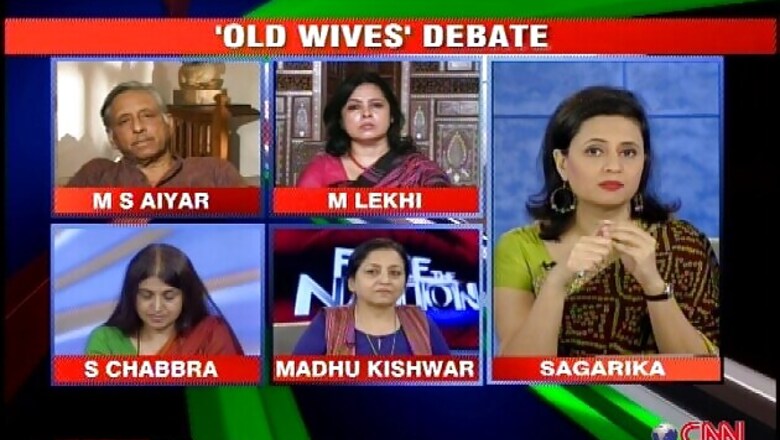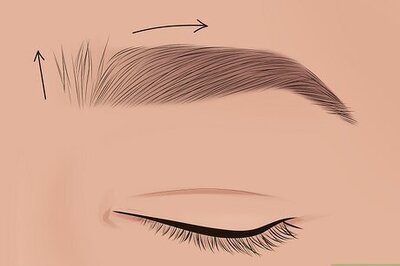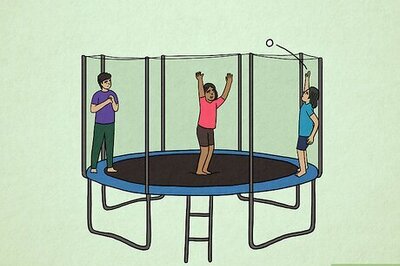
views
Sagarika Ghose: Hi there. "Biwi purani ho to maza nahin aata (when wives grow old there is no more fun), so said Union Coal Minister Sriprakash Jaiswal at a public function. He's not the first politician to make such statements. An FIR has now been lodged against Jaiswal and women's groups and women MPs have protested strongly. Jaiswal has apologised. But apology or not, does Jaiswal's statement once again reveal the deep gender biases that exist among India's politicians or should it be taken with a sense of humour? To debate that, we have tonight, Mani Shankar Aiyar, MP of the Congress. Joining us Meenakshi Lekhi, advocate of the Mahila Morcha and national Vice-President of BJP. Sagari Chabbra, documentary filmmaker joining us. Madhu Kishwar, editor of Manushi joining us. Mani Shankar Aiyar let's start with you, what do you think of Sriprakash Jaiswal, your party colleague's statement that old wives are no fun? Has he made a shocking statement, for a union minister to say at a public platform, or are the women's groups being prisoners of political correctness and failing to have a sense of humour?
Mani Shankar Aiyar: Well it is a stupid statement and it is not connected with him being a politician. This is a stupid statement for him to be made as a man, as hopefully a gentleman. He was at a kavi sammelan when he said that and presumably he has proven that he is a bad poet.
Sagarika Ghose: Meenakshi Lekhi, you of course have been attacking the Congress over this remark of Sriprakash Jaiswal. But what about your own BJP leader saying, Mukhtar Abbas Naqvi, saying some women wearing lipstick and powder have taken to streets and are abusing the politicians, they should not be spreading this disaffection against democracy. When it comes to speaking against women, or making anti-women remarks, it seems as if politicians on both side, whether Congress, or BJP stand are equally gender insensitive.
Meenakshi Lekhi: I'm not aware of Mr Naqvi's remark but if he said that it is unfortunate, and for once I agree with Mr Aiyar completely, and I think, think this kind of remark coming from any gentleman is absolutely not called for, specially in a public meeting and on a public platform.
Sagarika Ghose: Sagari Chabbra you saw what kind of reaction this statement had. There was a applause and people were laughing; so it that the kind of trivialisation, women's issues, is quite acceptable in our country - why blame Sriprakash Jaiswal alone?
Sagari Chabbra: I don't think it is fair to say that it is acceptable in our country, it is not. It is very tragic that he said that, it is offensive, it is insensitive. But let's go further from what he just said, I mean, let's look at the way our political class is behaving. For instance just sometime back you had this Haryana minister; he has been accused for aiding and driving a woman to suicide, on grounds of sexual harassment and abuse. So it is not just in thought and word but also in deed, that the way the political class is conducting itself. And it is not for nothing that India now ranks 105th in it's, you know, women that are in Parliament by the Inter-Parliamentary Union, the data that has come out, Pakistan, Bangladesh, Nepal, China even is way ahead of us in terms of our representation. And also we have to look at how women are representing us, or misrepresenting us. It is this entire political class across the spectrum that is betraying people, women and men. And, I think, we need to go beyond this gender bias and this particular, you know, looking that these particular words. Look at the conduct of our politicians.
Sagarika Ghose: Let me put that you, are politicians particularly bad? Is this kind of statement that a politician is making, and many politicians have made these statements, as we showed in our little clip? Sharad Yadav saying that 'parkati mahila' Women politicians will benefit from the Women's Reservation Bill. Mukhtar Abbas Naqvi saying lipstick and powder wearing women and are abusing politicians. Jyoti Basu saying Sonia Gandhi is 'merely a housewife'. Mulayam Singh Yadav saying women who come to Parliament are those who are the daughters of officers and businessmen, and will get whistled at. Anil Basu of the CPM saying America is giving Mamata the money. Why should she take money from Chennai and Bangalore? Rich clients have come, so there is no place for poor clients. So these are politicians across the board that have made these statements. So are politicians particularly bad?
Madhu Kishwar: It is not just politicians who are particularly bad, there is no double that there is more crime happening within political parties than in outside society. There are a large number of criminals going in politics because it has quick money. But more importantly look at the pedigree that it happened to a Congressman, Congress party which had people like Mahatma Gandhi, who century ago provided such a respectful space to women. At a time when no other country in the world was ready for the kind of space that Mahatma Gandhi provided to women, and he wanted them to play a leading role. I mean, in his statement that in this war women must play a leading role, and that is why in all this 'satyagraha' he had women in front. And making space for a woman as Congress president at a time when people in Europe hadn't even given women the right to vote. Then you come to Sharad Yadav, Mulayam Singh Yadav, the come from (*) background, one of the most protagonist of women's rights in India, so far ahead of it's time. And yet look at people who claim to take inspirations from him, the politics they are playing. Now in this case what comes out clearly is that with corruption, also comes ayashi. I actually feel sorry for his wife, how has Jaiswal's wife stood him all these years. Because this attitude ‘maza nahin aata' and the vulgarity of the language. And if you have a wife and a daughter at home the fact that you can use this kind of language in a public platform, and I think it was a girls' colleague that he was speaking at, shows extreme bad taste, and also shows how you treat women in your personal life and the space they occupy...
Sagarika Ghose: Let's put the Congress point to Mani Shankar Aiyar. Mani Shankar Aiyar what Madhu Kishwar is saying is that the Congress party which prides itself on its discourse, which prides itself on not going to the level of Gujarat Chief Minister Narendra Modi, as they have been saying recently that we will not speak about Narendra Modi, the way he speaks about us. But look at the vulgarity of that statement, ‘Biwi purani ho to maza nahin aata', surly this is something Congress party should be deeply ashamed of?
Mani Shankar Aiyar: Well you ask Congress spokesperson to answer your question. As far as I am concerned, I have already told you that it is a stupid remark to make. I would not wish to be associated as an individual or as a class. My own wife is 39 years, and I'm more in love with her today then I was back in 1973. So this business of targeting all politicians is I think the kind of discredits the kind of feminism we have been hearing. For example, we have just been told that some index, Inter-Parliamentary index, has indicated that we have fewer women as in proportion to the total parliamentary population than many other countries in south Asia, and other countries of Asia. But has that Inter-Parliamentary Union taken into consideration the fact that we have 12 lakh women in our panchayats and municipalities, for whom 86 thousand of them are office bearers. It is typical of the kind of prospective that I'm hearing in this programme that instead of looking at poor women and the way they have been empowered. There are more elected women in India alone then the rest of the world put together. Why aren't these women on our programme looking at them?
Sagari Chabbra: This Parliamentary data is about Parliament...
Mani Shankar Aiyar: But why didn't you add panchayats...
Sagari Chabbra: No, in the panchayati raj we need to empower the panchayats. When we give women reservation which is all very well, what kind of empowerment have you given to the panchayats? And, you know, it is true, and I agree with what Madhu said, this has been the history of this country that Mahatma Gandhi got women out of the char diwari and said ok come out of parda wear khadi in the movement. Netaji Subhash Chandra Bose launched the first all women's military wing of the world. So this is the history of this country, this is how women have participated in politics. And now we have come to this that we have these kinds of remarks and this kind of conduct by our members of Parliament and also of those people who have been elected. Do they really stand for the poor; in the history of India we have never had such a divide between the elected and those who elect them. I would also like to add that we need to look at the beautiful side of India; the beautiful side is that the social movements are full of women.
Sagarika Ghose: So it is not in the political sphere that we are seeing women participation, it is a non electoral social space. Mani Shankar Aiyar let me get you to respond to that, that the political sphere is taken over by money power, and muscle power, it is completely patriarchal setup that in fact if you look at ticket distribution, the ticket distribution has in fact been very squad against women in for example the BSP, which is led by a woman politician, she only gave 15 tickets in 2007 to women candidates. So political sphere is not where women can participate as equals, they have come in as bahus, as batis, that is where they are accommodated. It is a social sphere where women are participating. So politics is really lagging behind when it comes to gender justice.
Sagari Chabbra: Sagarika we don't call it social sphere, we call it non-electoral political sphere.
Sagarika Ghose: Non-electoral political sphere, that is more equitable to women then politics. Mani Shankar Aiyar let me just get you to respond to that.
Mani Shankar Aiyar: That you for your very succeed question. If you take your question so long, it will be difficult for people to answer with in the time available. The panchayats is a political sphere, and it is this Parliament, this overwhelmingly male Parliament, they provided one-third reservations not only for women to come into Parliament and to panchayats, but also for their positions in panchayats. Further if you take state like Karnataka, in Karnataka where as positions for women are reserved at 33 per cent for ST seats the actual number that got elected is 54 per cent. And all those proportions of the seats for the STs is reserved at 33 per cent, the number which actually got elected was 65 per cent. I agree with you that Parliament has a grossly insufficient participation of women, but it is my party and a majority, not a two-third majority in Parliament that believes in having women in our Parliament. And the house to which I belong to, Rajya Sabha has already passed that constitutional amendment; it is stuck in the Lok Sabha.
Sagarika Ghose: It is after all the Congress which is bringing the women's reservation bill.
Madhu Kishwar: But Sagarika the very fact that 60 years after independence you need a reservation bill in order to enhance the participations of women, when at the time of independence, and the framing of the constitution, women said we don't want reservations. Politics, electoral politics, party politics has been hostile to women. Not just women, I would say also to honest men. They have been marginalised only few have survived...
Mani Shankar Aiyar: In the panchayats also, why don't you look at the panchayats? Why are you not looking at the panchayats? Why are you not looking at the poor women, why are you looking at your own political ambitions?
Madhu Kishwar: Mani Shankar Aiyar, why are you being rude to us? This is also a very horrible putdown, you are not listening. We do look at panchayats and we are glad that 73rd, 74th amendments were passed. However, we know the difficult circumstances under which women function in panchayats. That territory has not been very friendly. There have been a lot of attacks, women who are not bahu, betis, even in panchayats, women who don't come from powerful families have it going very tough. You know it better than anybody else because you do keep track of it. And the fact that it has happened is to be celebrated, but the fact that panchayats are corrupt, and it is very difficult for women without family connections to have solid ground underneath their feet, you know better than I.
Sagari Chabbra: Let me just point out Sagarika that your channel for instance carried pictures of those people who stood in jal satyagraha, Omkareshwar dam. Now one of the people who was leading that movement is Chittaroopa Palit, or better know as Silvi among the activists. I mean, you know, these are the people who spend 20 years there. The Narmada Bachao Andolan is led by a woman called Medha Patkar, who has brought to light, over 20 years how people are being displaced, completely wiped-out to sought of fuel this model of development which has been borrowed by the west. So the point is that this political class which, I mean, I don't want to take any names, is not listening to the people.
Sagarika Ghose: Right, let me bring in the other politician...
Madhu Kishwar: Ask her whether with out her family if BJP would have put her in that position?
Sagarika Ghose: Respond to that Meenakshi Lekhi. You are attacking the Congress, what about how the BJP treats its women. What about how the BJP men have treated Uma Bharti, how they have treated Sushma Swaraj, all of these women to some extent subverted by the groups of men within your own party.
Meenakshi Lekhi: I completely disagree with this statement completely. Of all the political parties, BJP has been the most successful party in enrolling women at all levels. And we have implemented that 33 per cent across board on all positions. So I don't buy this argument. Now the second point which Madhu has raised, and that was specific to me that without my family connections could I have been made, what I had been made by the party, I think, I completely disagree with her because it is undermining my own potential and my own capacity.
Madhu Kishwar: No, I think, you are the most talented member of your family.
Meenakshi Lekhi: I'm sorry I'm not... If at all you discuss my family, then my family has taken nothing from politics. Let me tell you that my father-in-law established political party BJP are resigned from it on certain grounds, and my husband has not even joined politics. I have joined politics at the age of 43, so please don't bring in the family. I wanted to be in politics so I'm there. And my family if at all has a public (*), that is in terms of integrity.
Sagarika Ghose: Let's bring in the discussion back to gender justice in politics. Let me put it to Mani Shankar Aiyar about women in politics. Mani Shankar Aiyar, you know, there is phrase that is used to describe women in Indian politics, it is called female excision to male martyrdom that most women who come into politics in India come through a martyrdom of a powerful male. So either father, or husband dies and the women inherits its martyrdom. Is that the reason why women in politics have not been able to enter politics as independent individuals, they have to enter the politics through a male, through her association through a man.
Mani Shankar Aiyar: First, I started al the lowest level, there are 12 lakh women in our local bodies. I don't think anybody has conducted a survey of these women other than myself when I was minister of panchayats. Why are you obsessed with Parliament, like I'm obsessed with the panchayats. I will come to Parliament in a minute. I conducted a survey it was done by AC Nielsen, it was commented upon by Professor Nalini Gopa Jaya of the JNU. And it is a report which shows to extent to which genuine empowerment of the poor women of India has taken place as a result of panchayati raj. I now come to Assemblies and Parliament, it is a shame that our system has not generated an educate number of women into these positions in Parliament. And therefore my party has been trying for the last several years to push through a constitutional amendment tat will make sure that at least one-third of the members of our Assemblies and Parliament will be women. And I wish to stress that the most prominent women in Indian politics apart from Sonia Gandhi are people who do not have, what do you call it, martyrdom of a powerful male. That is a rubbish statement, do you think Jayalalithaa is, do you think Mamata is, I mean, what are you talking about. Do you think Sushma is, she is the leader of the opposition? Why are you denigrating the women who have done so well? And no body is objecting to them doing so well. There is definitely gender bias against the large number of women who ought to be in Parliament. But those who have beaten the system including Mayawati are not because they are daughters...
Sagarika Ghose: But Mayawati could be argued that she after all came through her mentor, who perhaps built that movement. But let me put it to Meenakshi...
Mani Shankar Aiyar: And look at the years that have passed since Kashi Ram fell ill, and she is the one when her husband failed to come to power. Why are you denigrating your own gender?
Sagarika Ghose: I'm not denigrating my own gender Mani Shankar Aiyar...
Mani Shankar Aiyar: But you are. Are you trying to tell me that you are running this programme because your husband is Rajdeep Sardesai?
Sagarika Ghose: Let me just bring in Meenakshi Lekhi in her. Meenakshi what I wanted to ask you is, are women themselves responsible for the kind of position they are finding themselves into. Women politicians do not take up women issues; Mayawati as I read in 2007 elections gave tickets to only 15 women. In the 2009 general elections the BJP gave tickets to only 44, Congress gave to 43, BSP 28. So are women themselves not interested in serving cause of women?
Meenakshi Lekhi: You see, unfortunately most causes of women have been propounded by men. It is not that women in power will discuss the women issues, I completely disagree with this position that women need to be in power so that they can discuss the women issues, that is not true because once they are in power they are as good as bad as any male colleague. So far as Mr Aiyar was making statement that his party is responsible for getting the bill through in Rajya Sabha, but then in Rajya Sabha when this bill got through his party was not in majority, number one. Number two, Mrs Gandhi has repeatedly said that we will bring the Lokpal Bill the way we brought the women's reservations bill. The women reservation bill was brought down by her own alliance, like Lalu Yadav, so it was meant to fail. Number three, even if the bill has failed in Parliament, irrespective of that if the BJP can implement 33 per cent quota across the board with in the party functionary, I think, Congress has much to learn, and they can cultivate the same habit with in the party. And fourth, I think women need to be in power to bring in more balance, but not necessarily that they will bring women issues. And women issues should not be issues which only women should propound...
Sagarika Ghose: These are justice issues, these are democratic issues, they are not women issues. Does politics remain completely male dominated and is there is deep gender bias?
Madhu Kishwar: No, I think, as long as politics is dominated by money and muscle power it will be hostile to women, but I would say I do think BJP has done well by instituting 33 per cent reservations for women at all levels.
Sagari Chabbra: We started of in our freedom struggle with having women engaged completely and this is where we have come to. Women in power are behaving like patriarchal women. They do not stand for issues; they do not stand for honesty.
Sagarika Ghose: We are completely out of time. Crime against women is increasing, it is very shocking that in times like this, when women are trivialised by non other than a union minister. Thank you very much indeed for joining us Mani Shankar Aiyar, Meenakshi Lekhi, Sagari Chabbra and Madhu Kishwar.















Comments
0 comment